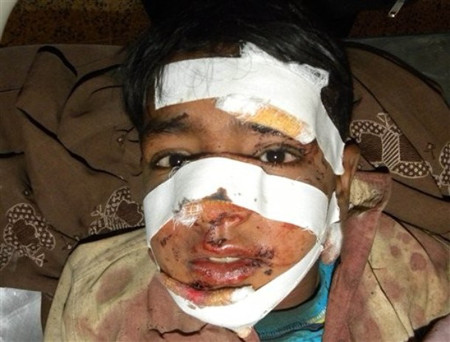By ELENA BECATOROS and TAREK EL-TABLAWY
KABUL, Afghanistan – A Taliban suicide bomber blew himself up among men washing in a bathhouse ahead of Friday prayers, killing 17, in an attack that showed militants can still largely strike at will in southern Afghanistan despite a NATO offensive.

Pakistani boy Mohammad Kamran who survives the suicide attack in neighboring Spin Boldak, Afghanistan, rests at a local hospital in Pakistani border town of Chaman on Friday, Jan. 7, 2011. A suicide bomber struck a bath house in a southern Afghan border town as men gathered to wash before Friday prayers, killing people, a provincial official said. The Taliban claimed responsibility, saying they targeted the deputy of an influential border patrol commander. (Photo: AP)
Roadside bombs also killed three NATO service members in the south and east, while gunmen shot dead a police inspector in Kandahar's provincial capital, bringing the day's death toll to 21. Authorities said they suspect the Taliban assassinated the police inspector.
The day's violence underscored the dangers in southern Afghanistan — and in particular Kandahar province, the birthplace of the Taliban. Some of the fiercest fighting in the nearly 10-year war has taken place in the south, where international forces, bolstered by the addition of 30,000 U.S. troops over the summer, are battling to to disrupt the insurgents' network.
The bathhouse bombing in the Kandahar province town of Spin Boldak, just across the border from Pakistan, was the deadliest single attack in Afghanistan in more than a month. Zalmay Ayubi, the Kandahar governor's spokesman, said 16 civilians and a police inspector were killed in the attack, and 23 were wounded.
The Taliban — in an unusual step given that 16 of the dead were civilians — quickly claimed responsibility. A Taliban spokesman in the south, Qari Yousaf Ahmadi, said the blast targeted the deputy of an influential border police chief.
The bomber struck around noon, as men gathered in the bathhouse on the main road heading out of Spin Boldak to the Pakistani border, witnesses and officials said. Located in the town's main market, the bathhouse is near a mosque popular with travelers going back and forth from Pakistan.
Twelve-year-old Mohammed Kamran, one of three Pakistanis wounded in the attack, was working at a barbershop near the bathhouse when the blast knocked him to the ground.
"I don't know who carried out this attack, but when I opened my eyes, I found myself in a vehicle," the boy said through swollen lips from his hospital bed in Chaman, the nearby Pakistani town where he was brought after initial treatment in Afghanistan. Bandages covered the wounds on his face and head.
President Hamid Karzai, whose government has been battling the Taliban while trying to bring them to the negotiating table, denounced the bombing as an un-Islamic act.
While U.S. President Barack Obama's administration has claimed some success in the south, it has acknowledged that the gains are reversible. The Taliban continue to carry out suicide bombings and plant roadside bombs that kill Afghan and coalition forces, as well as civilians.
As NATO has poured troops into the south, the insurgents have expanded their operations to other parts of Afghanistan once considered relatively safe, such as the north.
The intensified effort is critical for the coalition. The U.S. plans to begin withdrawing troops from Afghanistan in July, and NATO combat troops are scheduled to pull out of the country by 2014, handing over responsibility for the country's security to Afghan forces.
Afghan officials are pushing to ready their forces ahead of the deadline, but face numerous problems, including high attrition rates, widespread illiteracy that hampers their ability to operate and training the force essentially from the ground-up.
An additional challenge for the Afghan and coalition effort is posed by the Taliban's ability to cross back and forth across the porous Afghan-Pakistan border, finding safe haven in Pakistan despite pressure from Kabul and NATO on Islamabad to crack down on the insurgents.
The Taliban leadership is believed to be based in the Pakistani city of Quetta, 60 miles (100 kilometers) east of the Afghan-Pakistan border. Afghan officials have said repeatedly that allowing the insurgents to operate from within Pakistan is a threat to both countries.
The latest NATO deaths raised to nine the number of coalition forces killed this year and marked a grim start to 2011 for the forces. Last year, 702 NATO service members were killed, the deadliest year for the international force in Afghanistan.
Coalition officials estimate Taliban's numbers at 25,000 — roughly unchanged despite the international force's stepped-up offensive against insurgent leaders and rank-and-file fighters. The U.S. said this week it would send an additional 1,400 combat Marines to Afghanistan.
Associated Press writers Mirwais Khan in Kandahar and Matiullah Achakzai in Chaman, Pakistan, contributed.



